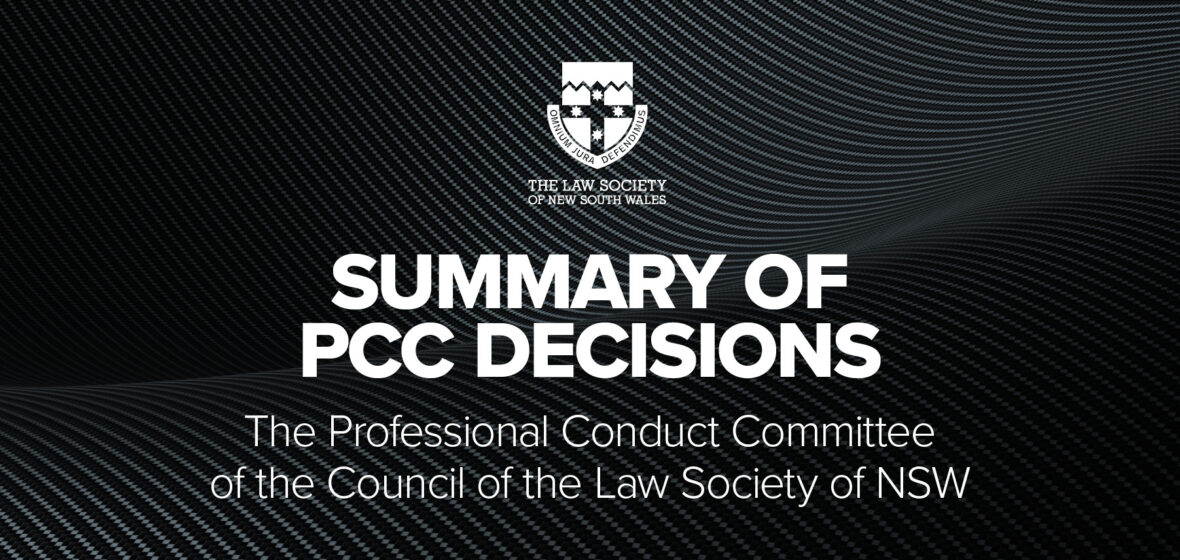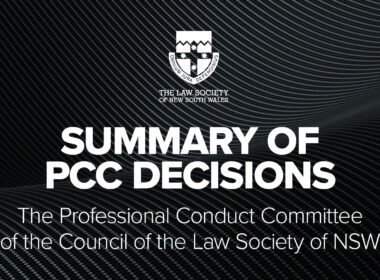The Professional Conduct Committee (the Committee) of the Council of the Law Society of NSW (Council), under delegation from the NSW Legal Services Commissioner and the Council, deals with complaints referred to the Council by the NSW Legal Services Commissioner. A total of 160 matters were finalised during the January to March 2023 Quarter.
In relation to 3 complaints, relating to 3 solicitors, the Committee decided to refer the complaints to the NSW Civil and Administrative Tribunal (NCAT) because they may involve professional misconduct, or unsatisfactory professional conduct more appropriately determined by the NCAT. Those proceedings must be commenced in the next six months.
The Committee also determined that 3 solicitors had engaged in unsatisfactory professional conduct.
In respect of the three solicitors:
1. All three were reprimanded.
2. Of those reprimanded:
a. One was ordered to apologise to the complainant, and complete ethics and trust account training within six months;
b. One was fined $1500.
The three matters determined this quarter involved behaviour of solicitors which:
- Was discourteous;
- Involved unethical behaviour; and
- Involved a failure to disburse funds paid to a Trust Account in accordance with instructions.
Statements to intimidate and tactics to frustrate another person
While one of the matters considered this quarter was primarily focused on discourteous behavior of the solicitor, it also considered the timing of correspondence and how that can contravene Rule 34.1.3 of the Legal Profession Law Australian Solicitor’s Conduct Rules 2015 (Conduct Rules).
Rule 34 of the Conduct Rules provides, amongst other things, that a solicitor must not, in any action or communication associated with representing a client:
- make any statements which grossly exceed the legitimate assertion of the rights or entitlements of the solicitor’s client, and which misleads or intimidates the other person (rule 34.1.1); and
- use tactics that go beyond legitimate advocacy, and which are primarily designed to embarrass or frustrate another person (rule 34.1.3).
In this case the solicitor had been asked not to send any correspondence to the other party for a short period of time as they were dealing with a bereavement in the family.
The solicitor did not respect that request, and instead sent correspondence on that day. In addition to sending the letter, notwithstanding the request, the tone of the letter was considered to be discourteous.
While Rule 34 was not found to be breached, solicitors need to be conscious not only of the content of their correspondence but also its timing. By sending the letter at the time they did, the solicitor caused the recipient to feel that they were trying to intimidate them or otherwise frustrate them.
Ultimately the solicitor was found to be guilty of unsatisfactory professional conduct as a result of sending discourteous correspondence. The solicitor was fined $1,500 and reprimanded for their behaviour.
Practitioners should note that in imposing a fine the Committee is expressing their disapproval of the conduct. The Committee is also acting to deter other practitioners from engaging in such conduct, as noted in Law Society of New South Wales v McCartney [2017] NSW CATOD 130:
“It is generally accepted that in making orders of the kind proposed (namely a reprimand and a fine) and other types of orders in proceedings of this kind, the role of the Tribunal is protective rather than punitive”
Unethical behaviour
The Committee considered a complaint about a solicitor who altered an insurance claim form after it had been signed by the complainant. The solicitor made the alterations without the complainant’s permission to do so and without informing the complainant that they had done so.
The complainant had instructed the solicitor to act in a claim for a Total and Permanent Disablement payment as well as additional matters not related to the unethical behaviour. In order to make such a claim the complainant completed a claim form with the assistance of the solicitor.
Sometime after the complainant signed the form the solicitor made some “tidy up amendments” to clarify some of their handwriting and relevantly also changed the date the form was signed. The consideration for the Committee was whether the alterations amounted to unsatisfactory professional conduct by the solicitor.
Section 296 of the Legal Profession Uniform Law (NSW) 2015 sets out that unsatisfactory professional conduct includes “conduct of a lawyer occurring in connection with the practice of law that falls short of the standard of competence and diligence that a member of the public is entitled to expect of a reasonably competent lawyer.”
The court in Potkonyak v Legal Services Commissioner (No 2) [2018] NSWCA 173 noted that the inclusive and “open-ended” definition of unsatisfactory professional conduct calls for an “evaluative determination.”
While the Committee considered that some of the amendments may not have amounted to unsatisfactory professional conduct, the alteration of the date did. The key difference was that the solicitor knowingly and intentionally changed the date to a false date in order to mislead the insurer.
The solicitor was found to have acted unethically and therefore had engaged in unsatisfactory professional conduct.
The Committee then turned its mind to the appropriate disciplinary order in the circumstances. In Clifton v The Council of the Law Society of NSW (2021) NSWSC 111, the court noted that:
“The protection of the public does not solely concern whether this practitioner is likely to commit he same misconduct again but includes protection of the reputation of the profession and the salutary effect which disciplinary proceedings are intended to have, not only on the practitioner concerned, but also on the profession generally and the way in which the conduct is regarded by the profession. The need to protect public confidence in the profession is an important purpose of disciplinary proceedings.”
In view of the conscious decision to change the date of execution, the gravity of that conduct, the court’s comments above, as well as the case of Council of the Law Society of NSW v Walsh (2018) NSWCATOD 196 at [33], the Committee resolved to reprimand the solicitor.
Failure to disperse funds
The final matter determined this quarter concerned a solicitor failing to disperse funds in accordance with instructions from the relevant person on whose behalf they were holding the money.
The complaint centered around an agreement to repay rental arrears and how that money was to be disbursed. In the agreement the parties had agreed that the rental repayments were to be paid to the solicitor’s Trust Account and that the solicitor would disburse the money 50/50 after legal costs were deducted.
Instead of disbursing it in accordance with the terms of the agreement, the solicitor paid money to his client after the client made an additional claim without consulting or advising the complainant (the client) of the claim or payment. The solicitor did this in circumstances where they were aware that the additional claim was contrary to the parties’ understanding and agreement for the disbursement of the funds.
- Section 138 of the Legal Profession Uniform Law (NSW) 2015, requires that (except as otherwise provided) a law practice musthold trust money deposited in the law practice’s general trust account exclusively for the person on whose behalf it is received; and
- disburse the trust money only in accordance with a direction given by the person.
It is key that before a solicitor disburses any money from their Trust Account, they are clear on who they are holding the money for. In this matter the solicitor was holding part of the money for their client and part for another party. This occurred as a consequence of the terms of the Agreement that the parties had entered into.
Therefore, while the solicitor thought that they were acting in accordance with instructions (on the basis their client had provided them) they were not. The solicitor’s intention is not relevant to whether there is a breach of section 138 but is significant for the purposes of considering the solicitor’s professional conduct.
The solicitor also claimed to have contacted the Law Society for its assistance however the content of the conversation could not be established. Practitioners should be aware that any information they receive from a phone call with the Law Society is general guidance and is not legal advice.
A finding of a breach of section 138 can amount to a finding of conduct that amounts to unsatisfactory professional conduct. The Committee therefore reprimanded the solicitor and is requiring the solicitor to undertake and complete ethics and accounting training with the Professional Support Unit of the Law Society.


